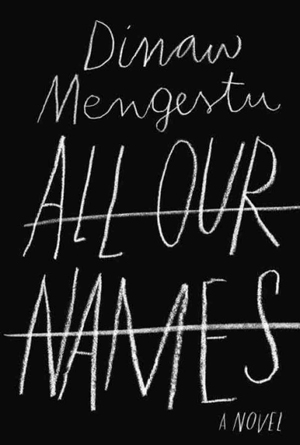
by by Margaret Kolb

Published by Alfred A. Knopf, 2014 | 256 pages
Dinaw Mengestu said of All Our Names that it is not a book about war, but a book about love. It’s an important distinction, so closely are the two often entwined in literature. In a Newtonian ‘equal and opposite reaction’ interplay, the more wonton and detestable the violence born of fear, the more redemptive and inspiring the resultant stories of heroism and love. In All Our Names, the two extremes appear in the same instant: an inebriated, bloodlust, machete-wielding mercenary kicking down doors in Kampala, Uganda, accessing the darkest primal potential in man, encounters a mother, instinctively shielding her child, the pinnacle of our human capacity for love and self-sacrifice. Mengestu’s text is in a sense an extended investigation of this relation, and our common culpability, suggesting in the end that we may yet overpower fear after all.
All Our Names is told through the perspective of two narrators, whose individual plot lines begin in vastly divergent times and places, then gradually progress towards intersection. The text begins in Kampala, Uganda through the voice of the nameless protagonist as he meets Isaac, a fellow displaced aspiring student. The two begin a modest social movement at the University until Isaac meets Joseph, a wealthy, well-connected, British-educated businessman that enlists Isaac and the protagonist in a revolt against the new post-colonial government. As the violence escalates, Isaac rises in the revolutionary ranks until a calamitous battle upends their increasingly sordid situation; Joseph is killed and Isaac gives his friend, the unnamed protagonist, a passport in his name to escape to the United States. In the parallel plotline, Helen, a social worker in a small Midwestern town, is assigned as guide to the unnamed protagonist, who has appropriated Isaac’s identity along with the passport. They begin an affair, understated and exclusively physical at first, but as their feelings develop, Helen and the new Isaac must confront the uncomfortable social reality of their mixed race relationship. Through mutual inquest, they excavate their own distressing pasts, self-images, and perceived hope for the future.
As Mengestu alternates the narrator and the context each chapter, he deliberately veils specific dates and places to keep the reader off balance. We can surmise from anecdotes about the British occupation that the Uganda chapters are set shortly after independence, and from the glimpses of overt racial tension in the American Midwest, that Helen’s chapters take place in the post-civil rights movement era. The effect is to foreground the characters’ journeys over their historical backdrop. Although All Our Names does not quite achieve the intricacies of individual narrative voices as Faulkner’s As I Lay Dying does, the shifts in time and place do complement Mengestu’s weightier message about Name, identity, and essence. He is challenging the Romantic idea of a Name that encapsulates identity and memory, exemplified by Pushkin’s “utter my name with sighs, and tell / the silence: Memory is true - / there beats a heart wherein I dwell." According to Mengestu, the comfort and nostalgia embodied in the Romantic poet’s ideal of Name and Identity is exactly that – a romantic ideal.
The political landscapes of 1970s America and Africa on display here are remarkably bleak. Cicero defined the commonwealth in relation to its application of justice; judged according to this formulation, there are no commonwealths in Mengestu’s text. In contemporary literary theoretical terms, his portrayal of contemporary politics mirrors that of Achille Mbembe concept of Necropolitics, in which political constructions are mere justifications for one group’s exercising of biopower over another. The Necropolitical world is, of course, a post-colonial moor, replete with injustices committed by national and international political bodies. But Mengestu’s analysis goes deeper than politics, exploring something akin to the “state of nature” wherein all interaction is dominated by fear.
The most tragic element within the political paradigm offered by All Our Names is that Joseph and Isaac are portrayed as having no ‘cause’ or utilitarian framework for their movement. They launch a “paper revolution,” playing on ethnic tensions, economic desperation, and the plethora of restless young men to fill their ranks, but they baldly seek to replace one self-serving dictator for another. True, details are sprinkled throughout the narrative to help contextualize the violence. Joseph represents the violent vestiges of British colonialism, at one point remarking that the British did not teach Africans how to kill, but taught them to be efficient and indifferent in their killing. Isaac represents the disillusioned and displaced youth, snidely remarking that all young men want to be revolutionaries for the romance without considering the pain inflicted. However, Mengestu understates these constructions and keeps the reader uncertain about places and dates to avoid narrowly defining the war within a discrete category, and to focus the reader on the war’s effects and the road to redemption.
The combination of wonton violence without clear cause, intention, or culpability is powerfully unsettling in Mengestu’s telling. In a classic Aristotelian tragedy, the hero(s)’ fall is precipitated by a fatal “mistake” (hamartia) which builds to a climactic moment of “recognition” (anagnorisis) and “reversal” (peripeteia). The audience must love the hero and lament her tragic twist of fate; in this sense classic tragedy is fundamentally about bad things happening to good people, which is part of what confers such emotional power. In All Our Names, the “tragedy” is far more ambivalent. The ending is the same as in a Greek tragedy – almost every dies – but there is nothing redeemable about Joseph and Isaac. After witnessing the atrocities they perpetrated, all that remains is emptiness. Mengestu’s depiction of the civil war is like Dante’s Vestibule of the Futile, where everyone is locked into perpetually futile Sisyphean pursuit as punishment for a life without moral anchor. Here, however, there is no metaphysical backdrop to ensure final justice.
Despite the bleakness of the text’s Necropolitical world, the collision of two antipodal worlds in All Our Names nevertheless creates a path towards redemption that neither could have accessed in isolation. Helen – the narrative voice of the second storyline - has grown up surrounded by racism and rural poverty, and has never been compelled to challenge her surroundings - until she meets the new Isaac. Isaac, when he meets Helen, has finally escaped the horror of war and constant fear of brutal violence. Through her he is able to begin the process of confronting his past. Escaping, he realizes, was not enough. He must, instead, reconcile his past with whatever future, and whatever Name, is to come.
Adam Karr graduated from the United States Military Academy at West Point in 2005 with a B.S. in International History with a focus in Latin America, and a Masters in English from the University of Virginia with a focus in Medieval Studies and Translation in 2014. Adam also served a 14 month tour in Baghdad, Iraq and a 13 month tour in Nangahar Province, Afghanistan. He will begin instructing English at West Point in August, 2014.















click to see who
MAKE Magazine Publisher MAKE Literary Productions Managing Editor Chamandeep Bains Assistant Managing Editor and Web Editor Kenneth Guay Fiction Editor Kamilah Foreman Nonfiction Editor Jessica Anne Poetry Editor Joel Craig Intercambio Poetry Editor Daniel Borzutzky Intercambio Prose Editor Brenda Lozano Latin American Art Portfolio Editor Alejandro Almanza Pereda Reviews Editor Mark Molloy Portfolio Art Editor Sarah Kramer Creative Director Joshua Hauth, Hauthwares Webmaster Johnathan Crawford Proofreader/Copy Editor Sarah Kramer Associate Fiction Editors LC Fiore, Jim Kourlas, Kerstin Schaars Contributing Editors Kyle Beachy, Steffi Drewes, Katie Geha, Kathleen Rooney Social Media Coordinator Jennifer De Poorter
MAKE Literary Productions, NFP Co-directors, Sarah Dodson and Joel Craig